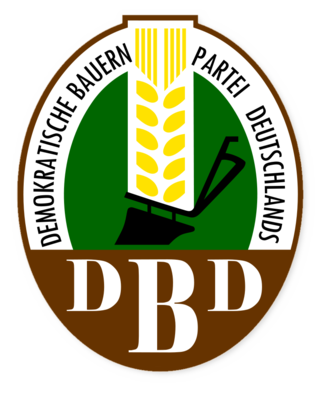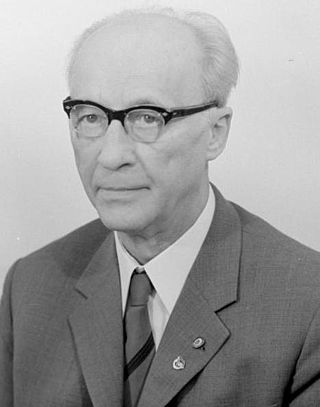
The National-Democratic Party of Germany was an East German political party that served as a satellite party to the Socialist Unity Party of Germany (SED) from 1948 to 1989, representing former members of the Nazi Party, the Wehrmacht and middle classes. It should not be confused with the far-right National Democratic Party of Germany, which was a party in West Germany and continues as a minor non-governmental party in the modern united Germany.

The Christian Democratic Union of Germany was an East German political party founded in 1945. It was part of the National Front with the Socialist Unity Party of Germany (SED) and a bloc party until 1989.

The Democratic Farmers' Party of Germany was an East German political party. The DBD was founded in 1948. It had 52 representatives in the Volkskammer, as part of the National Front. The DBD participated in all GDR cabinets. The founding of the DBD was an attempt by the SED to weaken the influence of CDU/LDPD in the rural community by establishing a party loyal to the SED. The leadership cadre came mainly from the ranks of the SED. In the late 1980s, the party had 117,000 members.

The Liberal Democratic Party of Germany was a political party in East Germany. Like the other allied bloc parties of the Socialist Unity Party of Germany (SED) in the National Front, it had 52 representatives in the People's Chamber.

The Landtag of Bavaria, officially known in English as the Bavarian State Parliament, is the unicameral legislature of the German state of Bavaria. The parliament meets in the Maximilianeum in Munich.

Johannes Dieckmann was a German journalist and politician who served as the 1st President of the Volkshammer, the parliament of East Germany, from 1949 to 1969.
This article aims to give a historical outline of liberalism in Germany. The liberal parties dealt with in the timeline below are, largely, those which received sufficient support at one time or another to have been represented in parliament. Not all parties so included, however, necessarily labeled themselves "liberal". The sign ⇒ denotes another party in that scheme.
This article gives an overview of liberalism and the historical radicalism movement within liberalism in Switzerland. It is limited to liberal and radical parties with substantial support, mainly proved by having had a representation in parliament. The sign ⇒ means a reference to another party in that scheme. For inclusion in this scheme it isn't necessary that parties labeled themselves as a liberal party.

The Landtag of Saxony, also known in English as the Saxon State Parliament, is the legislature of the Free State of Saxony, one of Germany's sixteen states. It is responsible for legislation, control of the government, and electing some state officials. The Landtag has existed in various forms since 1831, but the current body was established during German reunification in 1990. The Landtag is directly elected and has a term of five years.

The Deutsche Reichspartei (DRP), also known as the German Empire Party or German Imperial Party, was a nationalist, far-right, and later neo-Nazi political party in West Germany. It was founded in 1950 from the German Right Party, which had been set up in Lower Saxony in 1946 and had five members in the first Bundestag, and from which it took the name. Its biggest success and only major breakthrough came in the 1959 Rhineland-Palatinate regional election, when it sent a deputy to the assembly.
The German Democratic Republic was created as a socialist republic on 7 October 1949 and began to institute a government based on the government of the Soviet Union during the Stalin era. The equivalent of the Communist Party in East Germany was the Sozialistische Einheitspartei Deutschlands, which along with other parties, was part of the National Front of Democratic Germany. It was created in 1946 through the merger of the Communist Party of Germany (KPD) and the Social Democratic Party of Germany (SPD) in the Soviet Occupation Zone of Germany. Following German reunification, the SED was renamed the Party of Democratic Socialism (PDS), which eventually merged with the West German Electoral Alternative for Labor and Social Justice to form the modern Left Party.

The Communist Party of Germany is an anti-revisionist Marxist-Leninist communist party in Germany. It is one of several parties which claim the KPD name and/or legacy. It was founded in Berlin in 1990. The party is also commonly referred to by the name KPD-Ost to differentiate it from other parties with the same name, most prominently the historical Communist Party of Germany.

Hans-Heinrich Sander was a German politician for the Free Democratic Party.
Adolf Bauser was a German teacher, member of the Reichstag for the Reich Party for Civil Rights and Deflation and delegate for the Christian Democratic Union in the Landtag of Württemberg-Baden.

The German Party was a national-conservative political party in West Germany active during the post-war years. The party's ideology appealed to sentiments of German nationalism and nostalgia for the German Empire.
Rosa Aschenbrenner was a German politician. After the Second World War, she became increasingly marginalised from the political mainstream because of her opposition to rearmament.

The Leader of the Christian Democratic Union is the most senior political figure within the Christian Democratic Union of Germany. Since 31 January 2022, the office has been held by Friedrich Merz, who succeeded Armin Laschet.
Arthur Lieberasch was a Communist trades union official who became a member of the Parliament of Saxony and, after 1933 an anti-government resistance activist.

The Muslim Democratic Union short-form: MDU, was a minor Islamist political party in Germany. The party was founded during 2010 in Osnabrück and aimed to partake in the municipal elections the following year. It was primarily active in Lower Saxony, in particular Osnabrück, but also had members in North Rhine-Westphalia. The party was categorized as extremist and Salafist by the Office for the Protection of the Constitution in Lower Saxony.













